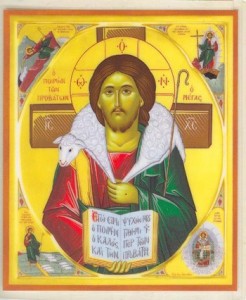Thoughts on Today’s Lessons for Sunday, May 11, 2014
First Reading: Acts 2:42-47The fourth Sunday of Easter is traditionally called “Good Shepherd Sunday” for its lectionary focus on sheep and shepherds as metaphors for God’s protective love. Our first reading, continuing the Acts narrative of the spirit-filled church after the first Pentecost, tells us how that infant flock lived in loving, sharing community as they recognized the joy and challenge of taking the good news of the Gospel to the world.
Psalm: Psalm 23
Who doesn’t love the 23rd Psalm? In time of trouble and of fear, the 23rd offers comfort. It gains even more power when we read it in context with Psalm 22, one of the most desperate psalms of lament. In the 22nd Psalm the poet utters the hopeless words that Jesus will later repeat on the cross: “My God, my God, why have you forsaken me?” Still, he calls on God in trust and hope. Then we turn the page and find comfort in the 23rd’s assurance that our loving Shepherd will watch over us and protect us all the days of our lives.
Second Reading: 1 Peter 2:19-25
Why does this reading seem to begin in the middle of a sentence? It may be a bit troubling to look back and see what came just before: The writer is offering this guidance to slaves, even those who toil for harsh masters. Perhaps it’s more useful for us to take this as general advice to all who suffer, remembering that Jesus suffered and died unfairly, having done no wrong. Like lost sheep, we suffer, but we know joy when we return to Christ, our shepherd and guardian.
Gospel: John 10:1-10
John the Evangelist expands on the shepherd image here, picturing Jesus not only as the good shepherd but also as the gatekeeper for the sheepfold, the protective guardian whose familiar voice reassures the sheep. Jesus is further portrayed as the knowing sheepfold gate that opens to allow those protected to enter, while closing to keep out those who would steal, kill and destroy his beloved sheep.

